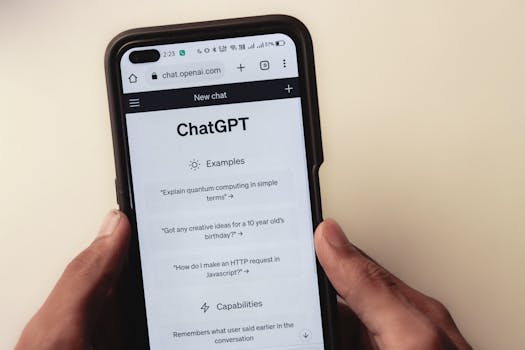Harnessing GPT for Enhanced Academic Performance
Many believe GPT is just a fancy tool for writing. I think it’s way more than that! It can streamline college applications like no other.
Imagine crafting essays with a brainstorming partner that never tires. AI can generate prompts and even help structure your thoughts. It’s like having a coach in your corner.
However, some folks think relying too much on AI is a slippery slope. They argue that true writing comes from personal experience and emotion. But I feel AI can enhance those qualities, not replace them.
For instance, Rick Clark from the Georgia Tech Admission Blog says, “AI can also be a useful tool as you consider how to construct your resume in the Activities portion of the Common Application.” This shows the potential of AI in various aspects of applications.
But let’s not forget the importance of human touch. Engaging with mentors or teachers adds depth to your application. I believe a mix of AI assistance and personal input creates the best results.
And here’s something fresh: the ethical implications of using AI in writing. We need to talk about academic integrity and how AI might influence original narratives. It’s about finding balance, not just convenience.
In conclusion, using GPT wisely can be a game changer in academic performance. It’s not just about shortcuts; it’s about enhancing your voice.
Relying on generative AI tools (such as ChatGPT) to draft even a preliminary version of your essays will result in less authentic, more generic writing that …
Preparing for Your Cornell Application | Undergraduate Admissions
This app is available only on the App Store for iPhone and iPad. ChatGPT … Developer Website · App Support. License Agreement. Privacy Policy. You Might …
Applicants with Foreign Credentials: Please click here to see specific application information before beginning the application. … ChatGPT. However, we …
Prospective Students – How to Apply | Admissions | Graduate School …
Maximizing Your Affiliate Marketing Strategy with AI
Here are some innovative ways to leverage GPT applications for affiliate marketing success:
- AI can analyze trends in real-time. This means you can adapt your marketing strategies quickly.
- Personalized content is a breeze with AI. Tailor your promotions based on user behavior for better engagement.
- Automate routine tasks to save time. Focus on strategy while AI handles repetitive tasks.
- Use AI for A/B testing. Quickly find out what works best without the long wait.
- AI can help optimize your SEO. Get insights on keywords and content that attract traffic.
- Predictive analytics can guide your campaigns. Understand potential customer behavior before they even click.
- Content generation is faster with AI. Use tools to create engaging articles and posts in minutes.
- Monitor competitor strategies effortlessly. AI can track their moves and help you stay ahead.
- Enhance customer interactions with chatbots. Provide instant support while collecting valuable data.
- AI can suggest products based on user preferences. This leads to higher conversion rates.
The Ethical Landscape of AI Utilization
Many folks think AI is a shortcut to success in education. But I believe it can lead to a lack of genuine engagement. Relying too heavily on AI tools might stifle critical thinking skills.
Sure, AI can help with brainstorming and organization. But it can’t replace the unique voice and perspective each student brings to their work. As Rick Clark from Georgia Tech points out, ‘AI can also be a useful tool as you consider how to construct your resume in the Activities portion of the Common Application.’
Some argue that using AI in writing is a slippery slope. I think it’s a balance. Engaging with mentors or teachers can provide context that AI simply can’t offer. This human touch adds depth and authenticity to applications.
There’s a growing conversation about the ethical implications of AI. Issues like academic integrity and originality are critical. We must ensure that students are crafting their own narratives, not just relying on AI-generated content.
As we move forward, it’s essential to set guidelines for AI use in education. This will help maintain a culture of original thinking. We should encourage students to use AI as a supplement, not a substitute.
In software development, the ethical implications are just as significant. AI tools can enhance productivity, but they can also lead to job displacement. We need to keep human oversight in the loop to ensure quality and integrity in software.
As noted by the Ploomber blog, with careful prompting, AI can produce working applications. But without human input, we risk losing the creative spark that drives innovation.
In short, the ethical landscape of AI utilization is complex. We must navigate it carefully, balancing innovation with integrity. Let’s not lose sight of what makes our work truly unique!
Mar 28, 2023 … ChatGPT can break the back of writing a job application, but it is up to you to take what it produces and edit it to ensure it is truthful, …
Nov 8, 2023 … Absolute madness. OpenAI CEO Sam Altman shows how to build your own GPT app in less than 4 minutes – without writing a single line of code.
How to build and sell GPT apps with Sam Altman | Zain Kahn posted …
Balancing Automation and Authenticity in Marketing
Most marketers think AI is the ultimate solution for boosting productivity. I think that while AI is powerful, it can’t replace the human touch. Authenticity matters in marketing.
Many believe automation is the way to go. But I argue that combining AI with genuine human insights creates a winning strategy. It’s about using AI to enhance, not replace, personal connections.
For instance, AI can analyze customer data and suggest trends. But it’s the human marketer who understands the emotional nuances behind those numbers. According to Jerry Jeon from Sendbird, AI can streamline processes, but it can’t replicate empathy.
People often rely solely on AI for content creation. But I think integrating insights from real conversations adds depth. AI can draft emails, but only you can infuse them with personality.
Many experts advocate for full automation in customer service. I disagree. A hybrid model allows AI to handle routine queries while humans tackle complex issues. It’s a balance that keeps customers happy.
We should also discuss the ethical implications of AI in marketing. Relying too heavily on automation could lead to a lack of originality. Authentic stories resonate more than generic content. Let’s not lose our unique voices in the pursuit of efficiency.
In conclusion, AI is a tool, not a replacement. Embrace it, but remember the value of authenticity. That’s where true marketing magic happens.
Best Practices for Utilizing GPT in Digital Strategy
Here are some effective strategies for harnessing GPT in your digital efforts.
- Use GPT for brainstorming sessions. It sparks creativity and generates fresh ideas in seconds.
- Leverage AI for content drafting. It helps streamline your writing process, making it faster and more efficient.
- Incorporate GPT in social media management. It can craft engaging posts and responses, saving you time.
- Utilize AI for SEO optimization. It analyzes trends and suggests keywords, boosting your content’s visibility.
- Experiment with personalized marketing. AI can tailor messages based on user behavior, enhancing engagement.
- Combine AI with human insights. Many believe AI is enough, but I think blending both creates richer content.
- Monitor AI outputs closely. AI can misinterpret context, so always review and refine its suggestions.
- Stay updated on AI advancements. New features can enhance your strategy and keep you ahead of the curve.
- Consider ethical implications. Always be mindful of how AI impacts authenticity and originality in your work.
- Explore new AI tools. The landscape is evolving, and fresh tools can provide unique advantages.
Top AI Tools for Efficient Content Creation
Here’s a quick rundown of AI tools that can supercharge your content creation process. These tools not only save time but also enhance creativity.
- . ChatGPT: This AI can help brainstorm ideas and draft content quickly. It’s perfect for overcoming writer’s block.
- . Jasper: Known for its user-friendly interface, Jasper excels at generating marketing copy. It’s like having a personal copywriter on demand.
- . Canva’s Magic Write: This tool combines design and writing. It helps create visually appealing content effortlessly.
- . Copy.ai: This tool specializes in creating engaging social media posts. It’s a time-saver for busy marketers.
- . Grammarly: More than just a proofreading tool, Grammarly offers style suggestions. It ensures your content is polished and professional.
- . Surfer SEO: This tool optimizes your content for search engines. It helps you write with SEO in mind from the start.
- . Frase: Ideal for research-heavy content, Frase gathers data and suggests topics. It’s a game changer for in-depth articles.
- . Lumen5: This tool turns text into engaging videos. Great for repurposing blog content into visual formats.
- . Writesonic: It generates blog ideas and outlines quickly. This makes the writing process smoother and faster.
- . Hemingway Editor: This tool helps simplify your writing. It focuses on clarity, making your content more accessible.
How GPT Streamlines College Applications
Here are some impactful ways GPT can simplify the college admissions process.
- GPT helps brainstorm essay ideas. It generates prompts that spark creativity.
- Drafting personal statements becomes easier. You can refine your thoughts with GPT’s assistance.
- Resume crafting is more efficient. GPT can suggest formats and highlight key experiences, as noted by Rick Clark from the Georgia Tech Admission Blog.
- Feedback on drafts is instant. You can iterate quickly, making the process less stressful.
- AI tools can help with time management. They keep you organized and on track, reducing last-minute panic.
- Collaboration is key. Using GPT alongside mentors adds depth, as human insights are irreplaceable.
- Ethical considerations are necessary. It’s essential to maintain originality and personal growth, as discussed in the topic of Ethical Considerations in AI-Assisted Writing.
Innovative Uses of AI in Content Creation
Many people think AI tools are just for automating tasks. But I believe AI can be a creative partner, helping to brainstorm and refine ideas. For instance, students often rely on AI for generating personal essays, but it can also spark unique content angles.
Most experts recommend using AI as a support tool. I think it can be much more than that. AI can help in crafting engaging narratives that resonate with audiences, especially in marketing.
According to Rick Clark from Georgia Tech, “AI can also be a useful tool as you consider how to construct your resume in the Activities portion of the Common Application.” This insight applies to content creators too; AI can assist in structuring compelling stories.
On the flip side, some argue that AI lacks emotional depth. I disagree. When used wisely, AI can enhance emotional storytelling by analyzing successful patterns in existing content.
While many suggest sticking to traditional methods, I think blending AI with human creativity can lead to groundbreaking results. Instead of solely relying on automated tools, we should embrace a hybrid approach that combines AI-generated suggestions with our unique voices.
As we explore new frontiers in AI, ethical considerations must be front and center. The integration of AI in content creation raises questions about authenticity and originality. We need to ensure that our narratives remain genuine, even when enhanced by technology.
Looking ahead, the future of AI in content creation is promising. Personalization and emotional intelligence in AI systems could transform how we engage with our audiences. The potential for AI to adapt and respond to individual preferences is exciting!
For further insights, check out Jessica A. Kent’s take on AI’s role in writing, where she notes, “While AI may be a poor option for writing your essay, it can be a great tool to support your work” from Harvard Summer School.
What are the main benefits of using GPT in education?
Using GPT in education can seriously lighten the load for students. It streamlines the college application process. No way! Imagine having a tool that helps you brainstorm ideas and polish your essays.
Many think AI tools like GPT might undermine originality. But I believe they can actually enhance creativity by providing a solid starting point. According to Rick Clark from Georgia Tech, “AI can also be a useful tool as you consider how to construct your resume in the Activities portion of the Common Application.” Read more here.
Critics worry about over-reliance on AI. But I think it’s about balance. AI should complement human effort, not replace it. Engaging with mentors or teachers can add depth that AI might miss.
Plus, the ethical implications of AI in education are a hot topic. We need to discuss how to use these tools responsibly. Academic integrity is key.
In short, GPT can be a game-changer in education, but we must wield it wisely. It’s all about using technology to boost our own creative processes.
How can AI improve my content marketing efforts?
Most marketers think AI is just a tool for automating tasks. I believe it goes beyond that because AI can analyze customer behavior and tailor content to their preferences. This creates a more engaging experience for the audience.
Many believe that relying solely on AI-generated content is the way forward. However, I think combining AI insights with human creativity is key. This blend ensures authenticity and emotional connection in marketing.
According to Jessica A. Kent, “Asking a robot to write your essays for you may seem like an easy way to get ahead, but outsourcing your work to ChatGPT can negatively impact not just your grades, but your ability to communicate and think critically.” This highlights how AI should support, not replace, human input.
Instead of solely relying on AI, engaging with human experts can provide deeper insights and a richer context for content creation. This approach fosters creativity and enhances the overall quality of marketing efforts.
The ethical implications of AI in marketing are also significant. Using AI responsibly ensures that we maintain trust and authenticity with our audience.
As AI continues to evolve, exploring its ethical implications in marketing is essential. Discussions around job displacement and the importance of human oversight are crucial to maintaining quality.
What challenges do marketers face when using AI?
Many marketers think AI simplifies their tasks. I believe it complicates things more than they realize. Sure, AI can automate processes, but it often lacks the nuance needed for effective communication.
For instance, AI-generated content can feel robotic. It misses the emotional connection that resonates with audiences. According to Jessica A. Kent from Harvard Summer School, “outsourcing your work to ChatGPT can negatively impact not just your grades, but your ability to communicate and think critically.” That’s a serious concern for marketers too.
Another issue is dependency. Relying too heavily on AI can stifle creativity and critical thinking. Many experts warn against this trap, advocating for a balanced approach. Instead of solely relying on automated tools, I suggest engaging with mentors or peers for fresh perspectives.
Moreover, AI can produce misleading information. Hannah Rozear from Duke University Libraries points out, “ChatGPT does not have the ability to match relevant sources to any given topic.” This can lead to miscommunication and damage a brand’s reputation.
Integrating AI into marketing strategies should be done cautiously. It’s not just about efficiency; it’s about maintaining authenticity and connection with your audience. Balancing automation with human insight is key to successful marketing.
Are there ethical concerns related to AI applications in marketing?
Many marketers believe AI is a shortcut to success. But I think it raises serious ethical issues. Relying too much on AI can lead to a lack of authenticity.
Most people think AI can create perfect content. I disagree because it often lacks the human touch. According to Jessica A. Kent, “Asking a robot to write your essays for you may seem like an easy way to get ahead, but outsourcing your work can negatively impact your ability to communicate and think critically”.
AI can generate misleading information too. This can harm your brand’s credibility. Hannah Rozear notes that “ChatGPT does not have the ability to match relevant sources to any given topic”.
Instead of fully automating content, why not blend AI with human oversight? This way, you get efficiency and maintain a personal connection with your audience.
Ethical guidelines for AI use are crucial. They help keep integrity in marketing. As we embrace AI, we must prioritize transparency and authenticity.
Many students stress over college applications. I believe using GPT can really lighten that load. It’s that simple!
While some argue that personal touch is key, I think AI can spark ideas and structure. It helps you focus on what truly matters—your unique story.
Experts say AI should be a tool, not a crutch. According to Rick Clark from the Georgia Tech Admission Blog, ‘AI can also be a useful tool as you consider how to construct your resume.’
But here’s a thought: Why not blend AI insights with human feedback? That’s where the magic happens!
As we embrace AI, we must also address the ethical implications. Crafting authentic narratives is still crucial in this journey.
Most people think AI can only assist with basic tasks. I believe AI can elevate your content to new heights. It’s not just about efficiency; it’s about creativity.
Take customer service, for instance. AI chatbots streamline responses, but they can also learn to personalize interactions, making them feel more human. This balance is key.
According to Jerry Jeon, AI’s advancements allow for knowledge-based interactions that truly engage users.
On the flip side, many argue that relying on AI limits originality. I think blending AI with human insight creates a unique synergy. This approach not only saves time but also enhances the authenticity of your content.
For instance, instead of fully automating responses, why not use AI for initial drafts and let your voice shine through in revisions? This method keeps your content authentic.
With AI, the potential is vast. Embrace it wisely, and watch your content thrive!
Most people think AI should do all the work. But I believe it should enhance our creativity. AI is a tool, not a replacement.
For instance, using AI for coding can speed up mundane tasks. However, relying solely on it can stifle original thought. As Jessica A. Kent said, “Asking a robot to write your essays for you may seem like an easy way to get ahead, but outsourcing your work to ChatGPT can negatively impact not just your grades, but your ability to communicate and think critically.”
It’s about balance. AI can suggest ideas, but the heart of the work must come from us. This way, we keep our unique voice alive.
Many argue that AI can handle customer service. But I think human interaction is irreplaceable. AI should handle routine queries, while humans tackle complex issues. This hybrid model promotes efficiency and connection.
As we embrace AI, we must remember: it’s here to support us, not replace us. Let’s use it wisely.
Most folks think AI should be a free-for-all. I believe we need boundaries. Without guidelines, we risk losing originality and authenticity in our work.
Many argue that AI tools are just fine for everything. But I think they should complement our skills, not replace them. As Rick Clark from Georgia Tech said, “AI can also be a useful tool as you consider how to construct your resume.”
There’s a fine line between assistance and dependence. The more we rely on AI, the less we think for ourselves. We must keep our creative juices flowing.
Ethical considerations aren’t just buzzwords. They shape our future in AI. We need to discuss these issues openly. It’s about preserving our voices in a world leaning too heavily on automation.
As we embrace AI, let’s not forget the human touch. Balancing innovation with personal expression is key to thriving in this new landscape.

Albert Mora is an internationally renowned expert in SEO and online marketing, whose visionary leadership has been instrumental in positioning Aitobloggingas a leader in the industry.



